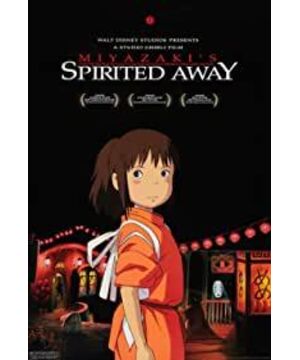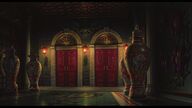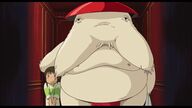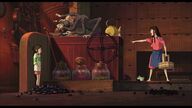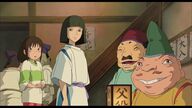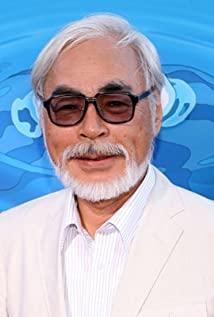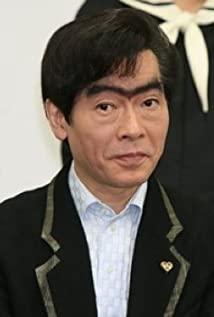On the big screen, after seeing "Spirited Away" again after many years, I was able to experience this masterpiece by Hayao Miyazaki in more detail. A few months ago, I also watched the re-screening of "My Neighbor Totoro" in the theater. I saw both films as a teenager and in my twenties, and the feelings are already blurred. Seeing each other again, seeing the dust elves flying under the moon, migrating like migratory birds, suddenly burst into tears. It seems that this precious affection has disappeared today, and at that time, people didn't realize it.
The emotional simplicity of "My Neighbor Totoro" is an affectionate and simple story with children as the main body. "Spirited Away", on the other hand, is a fairy tale for adults, which coincides with the turning point of human destiny in the millennium. The connotation that Hayao Miyazaki wants to express in it is indescribable, the hidden worries of the world, human politics, and Japan's overlapping generations. A large number of rich metaphors enable people to understand it from various dimensions, forming a three-dimensional emotional world. But it has a perspective in the same vein as "My Neighbor Totoro." In Miyazaki's films, children stay at a certain moment in childhood and look back deeply. Childhood is the homeland, the nostalgia of adults, but it can never be returned. The world is moving forward, and in the rumbling machine sound, his spiritual world is a retrospective idyll.
From this, I regard Spirited Away as a dream that looks back on childhood, a complete, healing dream with a clear psychological level.
The beginning of the story is a long-distance move. The bored girl is lying in the back seat of the car and has no vision for the new life to come. She is nostalgic for the old days, but her parents are focusing on the future, nostalgic for their daughter. Emotions appear indifferent. The heart of an adult is an iron wall, and it is hard forged after experiencing countless bereavements, but for children, a separation is the death of something. For the first time in Chihiro's young life, she experiences powerless separation. The fleeting sight of things will become an unforgettable sad journey in her memory.
"Spirited Away" was released in 2001, and fourteen years later, another classic animation was born at Pixar, and coincidentally, they used the same introduction. In "Inside Out", Riley experienced the first trauma in her life because she moved, away from her hometown of ice and snow, and bid farewell to her best friend. She fell into depression because she couldn't face the pain of separation. Different from the oriental mysticism, "Inside Out" has a bright rhythm. Through the drifting of the virtual emotional villain's mind, Riley's trauma healing is completed. She is through a certain expression (running away from home)— - being seen - being empathized by parents - the process of reaching reconciliation, accepting one's own grief, and accepting that growing up must be accompanied by a certain degree of farewell - thus, smoothly entering a new age stage, adolescence. However, Chihiro didn't make it this far. The children in Hayao Miyazaki's films do not grow up after completing their spiritual healing.
After passing through a long, dark tunnel, a classic retrospective imagery, Chihiro arrives at her dreamland. Born because of moving, the nostalgia for the old days, the anxiety about the new environment, and the dissatisfaction with the parents' neglect of their own needs are the origin of this dream. So in the dream, the parents were attracted by the fantastic deserted city, and despite her repeated protests, they walked into the place they called the abandoned theme park. In Chihiro's mind, the new environment, especially the new school her parents happily introduced to her in the car, was just such an unattractive wasteland.
The gluttony and gaffes of her parents after being attracted to food are unreasonable but in line with the ugliness of her parents in the dream, and her impression of the adult world - people are like pigs, greedy, drowsy, and ignorant. In the end, this anger turns him into a pig, which is Chihiro's punishment for his parents in a dream. But this generated a new emotion—guilt. A child who turns parents into pigs is bad, and she herself must be punished. So she gets lost in dreamland, trying to accomplish an unprecedentedly difficult task. She longs to go back to the past and soothe the pain of separation; she must also punish herself appropriately; finally, to bring her parents back and face the world again. When she stumbles on the streets as night falls and is surrounded by fear, it reminds me of the sensitive and fragile childhood, those dark dreams that have never been protected.
Throughout the story, there are three pairs of characters in a mirror-image relationship. Granny Tang - Granny Qian, Bailong - River God, Fat Baby - Faceless Man. The appearance of the white dragon is a symbol of the beginning of the recovery of childhood memories. He protects Chihiro and goes deep into the dream step by step. Like Taotie's parents, the witch, Granny Yu, from Chihiro's point of view, has the original sin of adults, greed, desire for control, and cruelty. At the same time, she is also important. She is the prototype of a strict mother, a "bad mother" created by Chihiro. The meaning of her existence here is to punish and supervise Chihiro (she said that Chihiro is a bad child who abandoned her parents). Through "suffering", the child believes in a dream that he can redeem his conscience and return to his parents. The grandfather and Granny Tang who are in charge of the boiler may be old people in the real world who took care of her in childhood, so although the fat baby is Granny Tang's child, she doesn't call her mother, only her mother-in-law. This kind of abnormal setting In reality, it is disordered, but in the dream, it is the reality in memory - the mother in Chihiro's fantasy is united with the mother-in-law who took care of her when she was young.
After modification, the image of the mother was divided into three roles in the dream, Chihiro's real mother (turned into a pig) - Granny Tang - Granny Qian. A very important detail, the twin mothers-in-law not only look exactly the same, they are dressed in the same clothes, and even the rings on their hands are in the same color order, and the yellow polka dot earrings they wear are exactly the same as those worn by Chihiro's mother in reality. Elements of reality, referenced in dreams, become a subconscious sign of them, meaning that they are all avatars of "Mother".
Interestingly, after I watched Spirited Away, a friend shared with me a dream from his childhood: because his mother scolded him fiercely, he dreamed that he was not her child, but a real mother. in the distance. One day, his real mother came to pick him up. He looked exactly like his real mother and wore the same clothes, but in his dream he felt that they were not the same person.
In contrast to Granny Tang's vicious greed, Granny Qian is a kind and wise good mother, possessing all the virtues of motherhood, and living in an anti-modern (in the movie, anti-magic) idyllic cottage. And the whole journey of healing in the dream is exactly the journey of Qianxun across the country, in pursuit of the farther shore, the mother in the heart, and the mother's place of origin. Accompanying her is another pair of mirror-image characters, the fat baby and the faceless man.
The fat baby is the beloved son of Granny Tang, and his image conforms to the now popular vocabulary, giant baby. An over-pampered fat baby living in a cozy fairy tale cabin and told not to go to the outside world because of terrifying deadly germs. He's someone who is locked into a certain life stage and unable to grow, characterized by self-centered instant gratification (if you don't play with me right now, I'll cry). The image of the giant baby being sealed in a secret room is Chihiro's imprisonment for herself. She believes that a baby who needs instant satisfaction in everything is "bad" and catastrophic. It is his willfulness that curses his parents into pigs. He cannot be released easily. In contrast to his excessive self-centeredness, the Faceless Man has no ego (as opposed to religious no-self) and is banished from the entire house and cannot enter.
The split of the self, the self that demands instant gratification, is capricious and dangerous, so it is protected in the top floor secret room; and the self that cannot express its true demands and thus is suppressed, creates a shadow and is exiled by the adult world. The former cannot go out, the latter cannot enter. And they all made a breakthrough attempt through Chihiro, so that the original order of the two was disrupted. She released the fat baby, took it out of her comfort zone, invited the faceless man into the big house, and became a spoiler. The faceless man is a child in the pre-language stage. He has consciousness and emotion, but no communication ability, so he needs to devour and imitate others in order to get the opportunity to speak. In the consciousness of the dream, Chihiro and black and white—the original self, the self that is considered a terrible destroyer, the self that does not allow its expression, the trinity, is the epitome of Chihiro’s inner desire, and together they embark on the search for therapy The road to healing. In the process, Chihiro also discovered motherhood from herself (she was like a little mother when comforting the fat baby and the white dragon), and the self (subject) of willful and childish merged with the quiet motherhood (object).
Her apprehension about the new life in the future turned into the motivation to go back to her childhood. The image of river, water, supports the flashy fragments she once indulged in when she was a child. Amber River, this river may have been buried in reality, and thus buried in the abyss of memory, for a long time, I have never thought of it. Until in the dream, the polluted river god came with a heavy body. The process of Chihiro helping him to clean up the silt and garbage is like digging out the vague memory in the depths of consciousness. The process of recalling the buried river has turned into labor in a dream. She cleared the garbage out of the body of the river god, and the river god held her with the hands of water, and for the first time she had a flashback of memories in the water.
The second flashback was when she fell while holding the injured white dragon. The white dragon and the river god are the young and old faces of the same river. When she washed the river god, the river god laughed and turned into a dragon-shaped water column that soared into the sky, which is a metaphor for the unity of the two. She is breaking through the many disguises of memory and getting closer and closer to the source. It wasn't Bai Long who forgot the name of the river, it was Chihiro herself in reality. What she forgot was the sensory memory buried with the soil. The feeling of being nurtured and held up by the warm water in the river is the feeling of being nurtured in the cold reality. Lost in search. It is the price that human beings have to pay for their progress towards modernization.
The pursuit in the dream, back to the source of motherhood. Chihiro, the fat baby, the faceless man, and the white dragon came to the other side together, and the bad mother turned into a good mother. She is so gentle, she forgives all their past sins and mistakes, and gives blessings of love. A bad mother is responsible for punishment, and a good mother is responsible for forgiveness and love. When the two are balanced, the dream comes to an end - Chihiro told Bailong the name of Amber River, and the old days suddenly returned to her heart. Rediscovering is eternal in the dream, supporting every child to travel forward.
In the end, the white dragon sent her to the ferry, where the dream began, and the scene of holding hands and promising to meet again was really touching. His image, in the dream is such an all-powerful protector, gentle, mysterious and powerful. The love between him and Chihiro is also not like the love in the world, like the love between the loyal dog and the companion of the little master, which surpasses the self. After accompanying her to visit her parents in the pigsty, the magic rice balls he gave her were like a god-like bright consolation. Seeing Chihiro's tears falling down, I was also moved to tears. The love in it is probably touched by this deep tenderness. In childhood, human beings have touched it more or less, such original tenderness.
And it will eventually fade away. When watching "My Neighbor Totoro", the tears shed for no reason are now clear. In Chihiro's dream, in Hayao Miyazaki's movie dream, the true beauty of childhood, the more colorful, the more sad it is. The picture of Chinchilla sitting under the moon is the Garden of Eden for human beings. Chihiro's trip to Zeguo, the street lamp that jumped to meet her will also shine forever in the corner of her dream. And she has to step by step, out of the tunnel, towards the unknown world, towards cruelty.
The song written by Luo Dayou and the "Children" sung by Ye Dexian, listening to it at this moment, is exactly the portrayal of Qianxun. It is also the life song of every child in Hayao Miyazaki's films.
Far, near and near, the city is high and low, and the road is broken and broken, where can there be a final stop It has become short-lived, cold, warm, and affectionate. When people grow up, it is more difficult to get together for a long time.
There is only one blood in a lifetime, and getting along so close is like being a stranger, but I feel that there are a few people in my life who will love you. It is because of deep love that you regret
You and I seem to be drunk and can't tell clearly that they belong to you, I, and I. Feelings of love The world is too cold, who will stretch out their hands to surround you and create warmth again, talk, laugh, and laugh. I used to feel happy and happy. There is a world, the world is too wide, since the day you were born, the childishness has been drifting away every year
View more about Spirited Away reviews


